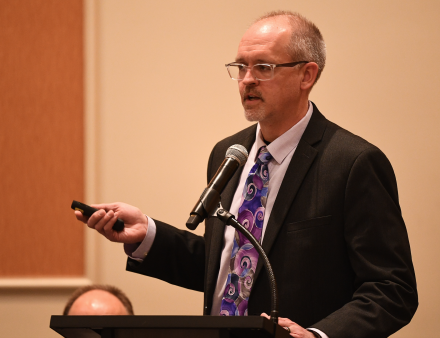Professor of Exercise Science and Faculty Athletics Representative Eric Hall was featured on a recent NCAA panel about high-impact practices and their role in the student-athlete experience.
The NCAA is finding new ways to more effectively provide the student experience for student-athletes, and Elon faculty members are at the forefront of the initiative.
Eric Hall, professor of exercise science and faculty athletics representative, was a panelist for an NCAA discussion on high-impact practices at the organization’s first-ever Academic-Athletics Summit on Jan. 22. The summit preceded the 2020 NCAA Convention in Anaheim, California.
High-impact practices are deep learning opportunities – like studying abroad, service learning and internships – meant to deepen student learning and positively impact retention, graduation and future careers.
Hall delved into the topic on a panel alongside Lydia Bell, associate director of research for academic performance for the NCAA; John DeGioia, president of Georgetown University; Luoluo Hong, associate vice chancellor for student affairs and enrollment management for the California State University system; Grace McGuire, a former Utah State student-athlete and current Mountain West Conference representative on the NCAA Division I Student-Athlete Advisory Committee; and Malcolm Holland, a former University of Arizona student-athlete.

“This idea of transferrable skills was really prevalent in the conversation we were having,” said Hall, a member of the NCAA’s committee on academics. “The panel focused on what happens after graduation and how student-athletes can leverage these high-impact practices to get jobs.”
According to researchers George Kuh and Ken O’Donnell, high-impact practices must meet certain guidelines. They must come with high expectations for performance, extended investment of time and effort, experiences with diversity, frequent feedback, public demonstration of competency, faculty and peer interaction, opportunities to reflect and integrate learning, and real-world applications of that learning. The panel discussed these guidelines and considered ways to further integrate high-impact practices into intercollegiate athletics and whether athletics themselves should be classified as high-impact practices.
Hall says the proper integration of high-impact practices into intercollegiate athletics will take the college experience of each student-athlete far beyond what they learn in their chosen sport.
“The student-athlete experience is not just about participating in athletics, but there need to be some other things to make it more enriching,” Hall said. “There has to be some sort of mentorship, there needs to be some reflection about it. It’s not just about doing the experience but thinking about what that experience really is.”
Panelists at the Academic-Athletics Summit spoke before an audience of college and university presidents, provosts and athletics directors from across the country as they discussed ways to improve the student experience for student-athletes and the general student body.
During the discussion, Hall shared research on high-impact practices that he conducted with Professor of Exercise Science and Chair of the Department of Exercise Science Caroline Ketchum and Associate Professor of Sport Management and Chair of the Department of Sport Management Tony Weaver.
The research was funded by the Colonial Athletic Association’s Colonial Academic Alliance grant program, a multi-institutional research effort of the Colonial Athletic Association. Elon received the grant to study high-impact practices, student-athlete access to them, and the barriers that might prevent student-athletes from participating.
“Most institutions will say they have access for student-athletes, but participation rates aren’t necessarily the same as they are for the rest of the student body,” Ketcham said. “So we’re looking to figure out ways that institutions can have some best practices and targeted initiatives to make that access possible and participation rates a little higher.”
Hall, Ketcham and Weaver’s research also makes a case for classifying intercollegiate athletics as a high-impact practice and looks into how to truly tap into those experiences to benefit student-athletes.
“At Elon, we want our student-athletes to be students, and we want them to have access to all the other opportunities that our students have on campus,” Hall said. “We want all of our students to have access to these opportunities, so trying to engrain them in athletics is important to us to make sure that they have what we think is that Elon experience.”



